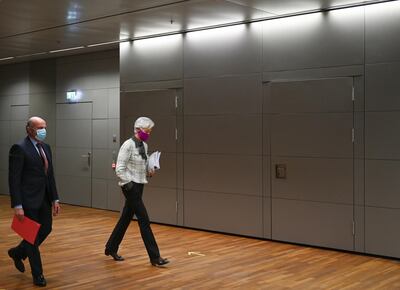The eurozone economy rebounded more than expected in the third quarter of this year from its Covid-19 slump, but economists warn the rally will be short-lived as countries impose new restrictions to stem the second wave of the pandemic.
Gross domestic product in the 19 countries sharing the euro surged 12.7 per cent quarter-on-quarter in the three months ended September 30, after contracting 11.8 per cent in the second quarter of the year, according to Eurostat, the European Union's statistics office.
While this meant the bloc recouped almost three quarters of the GDP contraction seen during the lockdown in the first half of the year, analysts said the outlook for the fourth quarter is darkening amid tightening restrictions across the bloc.
“Although the Q3 GDP data came in almost uniformly above consensus expectations, the mood in most European capitals will currently be a sombre one given the quickly rising infection rates across the continent and the re-introduction of national lockdowns in several countries,” said Kay Daniel Neufeld, head of macroeconomics at the Centre for Economics and Business Research.
“The new lockdowns will require further fiscal and monetary stimulus to prevent catastrophic increases in unemployment and falls in household incomes. If done right, we might see a similar bounce back in economic activity in Q1 2021.”
The new figures suggest that countries hit especially hard during the second quarter showed a stronger bounce back, Ms Daniel Neufeld added, with the eurozone’s GDP mainly boosted by France, Italy and Spain.
France registered quarterly growth of 18.2 per cent, following a 13.7 per cent fall in the second quarter, while Spain recorded 16.7 growth, following a 17.8 per cent fall in the three months ended June 30, and Italy’s growth was at 16.1 per cent, following a 13-per-cent fall in the previous three months.
Germany, the eurozone’s biggest economy, grew 8.2 per cent quarter-on-quarter, which led the country to revise its economic forecast for the year to a 5.5 per cent contraction, instead of the earlier expectation of 5.8 per cent.
“The relatively strong recovery in the third quarter is of little comfort, given that the economy looks set to contract again in Q4. For now, we have pencilled in a 2.5 per cent quarter-on-quarter fall in France, but the scale of the Q4 downturn is highly uncertain and could be much bigger if the lockdowns stay in place beyond November,” said Andrew Kenningham, chief Europe economist at Capital Economics.
Separate data from Eurostat showed that eurozone unemployment held at 8.3 per cent in September, unchanged from the previous month. Inflation was also stable at -0.3 per cent in October, driven in by deflation in energy prices.
The surge in third-quarter output in the eurozone failed to lift stock markets on Friday, which have spiralled downwards this week amid jitters over a rising coronavirus infection rate.
“It comes as no surprise to see markets fail to post a proportionate rally, with fears of a double-dip recession continuing to stifle short-term achievements,” said Joshua Mahony, Senior Market Analyst at online trading company IG. “Much like the whopping 33.1 per cent US GDP reading, the eurozone growth figure of 12.7 per cent produced almost no reaction for stocks, with traders firmly focused on the here-and-now.”
New lockdowns will require further fiscal and monetary stimulus to prevent catastrophic increases in unemployment and falls in household incomes, Ms Daniel Neufeld said.

On Thursday, European Central Bank president Christine Lagarde made it clear that more stimulus would likely be made available in December based on the lender's latest forecasts.
“While the ECB kept both interest rates and the volume of their asset purchase programme stable in yesterday’s Governing Council meeting, expectations are that the December forecasts will show a clear deterioration in the growth outlook paving the way for more stimulus from the central bank," said Ms Daniel Neufeld. "
Mr Kenningham agreed that the most effective way to cushion the blow from another lockdown is through more generous fiscal support, including “one-off cash transfers to households and businesses”.


